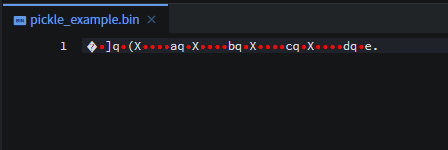1. Pickle?
- 객체를 저장할 때 사용할 수 있는 라이브러리
- 객체를 직렬화(Serialize)하고 역직렬화(Deserialize)할 수 있게 해준다
- 직렬화: 객체의 데이터를 바이트로 바꾸어 저장
- 역직렬화: 바이트로 저장된 데이터를 다시 원래의 객체로 복원
- 객체는 문자열처럼 일반 텍스트로 저장할 수 없기 때문에 바이너리로 바꾸어 저장해야 한다
- 바이너리로 저장된 파일은 읽을 수 없지만 저장, 전송에 효율적임
- 바이너리로 저장된 파일은 txt가 아닌 bin형식으로 저장
2. Pickle의 사용법
- pickle.dump(객체, "파일이름") 를 이용해 객체를 직렬화
- pickle.load("파일이름") 를 이용해 객체를 역직렬화
3. Pickle을 이용한 객체 저장
1) List 저장
L = list('abcd')
with open('pickle_example.txt', 'w') as file:
file.write(L)위와 같이 리스트를 txt로 저장하려 하면 아래와 같이 TypeError가 발생한다.
(write메서드는 문자열만 인수로 받기 때문)
TypeError: write() argument must be str, not list
pickle 라이브러리를 사용하면 정상적으로 파일을 저장할 수 있다. 이 때, 옵션에 쓰기 옵션인 "w"와 "b" 옵션을 같이 주면 바이너리로 저장할 수 있다.
import pickle
L = list('abcd')
with open('pickle_example.bin', 'wb') as file:
pickle.dump(L, file)
2) List, Dict, Str 저장
list 이외에도 파이썬 객체면 모두 pickle 라이브러리를 이용해 파일에 저장할 수 있다
import pickle
class SimpleClass(object):
def __init__(self):
self.x = 10
self.y = 20
L = list('abcd')
D = {'a': 1, 'b': 2, 'c': 3}
S = "abcde"
with open('pickle_example.bin', 'wb') as file:
pickle.dump(L, file)
pickle.dump(D, file
with open('simpleclass.bin', 'wb') as file:
pickle.dump(SimpleClass, file)리스트와 딕셔너리, 문자열을 pickle을 이용해 bin 파일로 저장
import pickle
with open('pickle_example.bin', 'rb') as file:
data_list = []
while True:
try:
data = pickle.load(file)
except EOFError:
break
data_list.append(data)
print(data_list)pickle.load를 이용해 객체를 다시 불러오는 것이 가능하다
[['a', 'b', 'c', 'd'], {'a': 1, 'b': 2, 'c': 3}, 'abcde']
3) 사용자 정의 클래스의 인스턴스
- 사용자 정의 클래스 저장 파일
import pickle
class SimpleClass(object):
def __init__(self):
self.x = 10
self.y = 20
def set_z(self, z):
self.z = z
S1 = SimpleClass()
S1.set_z(30)
if __name__ == '__main__':
with open('simpleclass.bin', 'wb') as file:
pickle.dump(S1, file)
- 사용자 정의 클래스 불러오기 파일
import pickle
from openfile import SimpleClass
with open('simpleclass.bin', 'rb') as file:
S1 = pickle.load(file)
print(S1.x, S1.y, S1.z)
- 주의할 점은 pickle은 dump할 때 클래스에 대한 내용은 저장하지 않는다는 것
- 클래스를 불러오기 전에 python 파일에서 클래스 구조를 미리 불러와야 pickle.load를 할 때 정상적으로 인스턴스를 불러올 수 있다
4. RCE(Remote Code Execution) 취약점
- pickle 라이브러리는 안전하지 않음
- pickle 라이브러리의 load 메소드는 RCE취약점 문제가 있으므로 사용에 있어 주의를 해야한다
- RCE란 외부에서 전송된 코드가 실행되는 취약점을 말한다
- 그러므로 외부에서 받은 pickle은 절대 받지 않도록 주의한다
'Python > Syntax' 카테고리의 다른 글
| [Pandas] DataFrame - 2 (행/열 추가, 값 선택/변경, 전치) (1) | 2022.01.10 |
|---|---|
| [Pandas] DataFrame - 1 (자료형, 생성, 행/열 이름변경, 행/열 삭제) (0) | 2022.01.10 |
| read_excel로 xlsx 파일 열기 (0) | 2021.11.21 |
| [Python] sys.stdin.readline (0) | 2021.07.25 |
| [Python] List의 요소 삭제하기 (pop, remove, clear, del) (0) | 2021.06.27 |